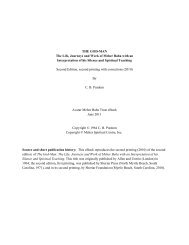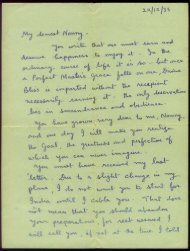Short History - Avatar Meher Baba Trust
Short History - Avatar Meher Baba Trust
Short History - Avatar Meher Baba Trust
Create successful ePaper yourself
Turn your PDF publications into a flip-book with our unique Google optimized e-Paper software.
most of them essentially complete, though a few were significantly trimmed and<br />
reduced.33 The primary thrust of Purdom’s editing, however, lay in the arena of prose<br />
style; and here Purdom revised extensively, mostly in the interests of simplicity and<br />
economy of expression. In his introduction—which is itself a memorable and eloquent<br />
statement—Purdom characterizes his undertaking thus:<br />
The discourses contained in this volume were not, usually, dictated word by<br />
word. <strong>Baba</strong>’s method was to state a theme and to indicate a general outline,<br />
which was completed by an Indian disciple, though sometimes he would go<br />
over every word. The language and methods of illustrating what was said<br />
were for Indian hearers and readers; in preparing the discourses for western<br />
publication, they have not been re-written, but what seemed to be redundant<br />
words and phrases have been eliminated to reduce their length and to make<br />
them clear without, however, any other change.<br />
In actual practice, Purdom’s editing went beyond what this description would seem to<br />
suggest: from time to time he excised paragraphs or even extended passages, and other<br />
sections were greatly boiled down to a fraction of their original expanse. Occasionally he<br />
pared away certain significant details; for example, his rendering of the discourse on<br />
“<strong>Avatar</strong>” eliminates reference to the fifty-six God-realised souls on earth at all times.<br />
Nonetheless, Purdom did not “rewrite” in the sense that, while he trimmed and cut, he did<br />
not introduce new content or verbiage of his own. God to Man and Man to God does not<br />
attempt to “re-create” the Discourses in any way, and it should not be regarded as an<br />
interpretation or a “version.” It is indeed what Purdom intended it to be—<strong>Meher</strong> <strong>Baba</strong>’s<br />
Discourses somewhat pared down (sometimes in content) and expressed in a more<br />
economical prose style.<br />
When God to Man and Man to God was published, <strong>Meher</strong> <strong>Baba</strong>’s disciples and<br />
close devotees around the world seemed to be cognizant of <strong>Baba</strong>’s practices in the<br />
dictation of messages, and none of the published responses express alarm at the fact that<br />
they had been significantly edited. In a letter published in the Awakener Magazine (a<br />
quarterly magazine) earlier that year, Mani S. Irani, <strong>Meher</strong> <strong>Baba</strong>’s sister, referred to the<br />
matter thus.<br />
Did I tell you that Charles Purdom has been working on the “Discourses,”<br />
and the revised version will be published soon. There are those who believe<br />
that literally every word in the original Discourses is <strong>Baba</strong>’s and are<br />
reluctant to accept any revised version; but actually, though <strong>Baba</strong> dictated<br />
for hours on the board, Professor Deshmukh embellished and worked up<br />
the points. Though Deshmukh has undoubtedly done brilliant work in many<br />
places, we feel there are many places where simplification of sentence<br />
structure or correction of grammar would enhance the beauty and simplicity<br />
which are the essence of <strong>Baba</strong>’s teachings. Deshmukh preferred not to give<br />
his name at all (though he was urged by some of the Mandali to do so) as



